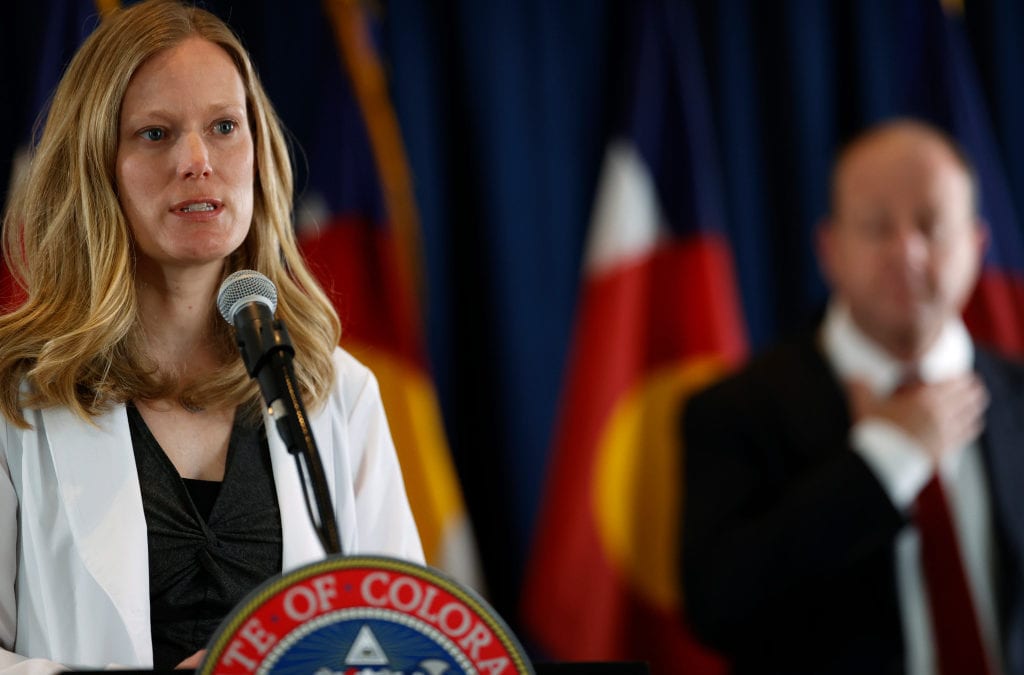Colorado’s health department has routinely deleted emails sent and received by officials responding to the coronavirus pandemic, despite a request by the state archives that agencies save all documents related to their management of the historic public health crisis.
The Denver Post discovered the Department of Public Health and Environment deleted public records after requesting emails sent and received by state epidemiologist Dr. Rachel Herlihy. Emails belonging to state employees are public records under the Colorado Open Records Act.
“…(E)mails from May would have already been auto-deleted unless otherwise preserved, or they were previously deleted by Dr. Herlihy as part of a normal business process,” Monica Wilkerson, the department’s records and legal services liaison, wrote in response to The Post’s request.
The Post will receive some records, including emails, from the health department that were preserved. As of last year, the agency’s policy was to delete most employee emails after 90 days.
The health department’s purging of emails mirrors similar practices across Colorado’s state government to empty inboxes regularly, with some departments — including the governor’s office — deleting most emails after just 30 days.
Earlier this year, Colorado journalism organizations asked state agencies to be transparent and retain records related to the pandemic given its historic nature.
It’s important to keep records related to the state’s response to COVID-19 so that journalists can report on a crisis impacting Coloradans’ health and safety, said Jeff Roberts, executive director of the Colorado Freedom of Information Coalition..
“I’m disappointed because we asked for this,” Roberts said of the health department’s deletion of emails related to its coronavirus response. “Just because they may not think the messages are important to keep, those are government records and they are the public’s records.”
State officials stressed they are following procedure and the law.
“To be clear, we haven’t changed our record-retention policy during the pandemic; we are, of course, preserving what the law requires us to preserve,” said Ann Hause, director of the office of legal and regulatory compliance at the agency, in a statement.
“CDPHE maintains records in accordance with our record-retention policies and state statute. The department or program retention schedules, as required by law, are based on the content of the record and the business need,” Hause said.
In order to make sure records pertaining to the state government’s response to COVID-19 “are kept for posterity,” the Colorado State Archives posted a notice online in June requesting other departments “start thinking about what records you and your agency are creating, and keep all records related to COVID-19.”
The state Department of Public Health and Environment said in a statement that it is following the state archives’ guidelines and state statute.
“The State Archives Office recommends we save correspondence showing significant new policies or work practices in place during the pandemic,” the health department said. “Correspondence includes letters, memos and emails.”
On its website, the archives explained why state agencies should save COVID-19 records, saying “(f)uture historians, as well as future staff of your agency or office, will benefit from the records you keep now. They will reveal how you communicated with the public and how you directed staff to continue their daily service to Colorado citizens while remaining safe and healthy.”
A spokesman for the state archives did not respond to questions Tuesday.
More than 60 news organizations, including The Post, sent a letter to Gov. Jared Polis in April, asking for transparency in the state’s response to the coronavirus pandemic.
The letter specifically asked that all public officials in Colorado “retain emails, text messages, messages from platforms such as Slack and Zoom recordings related to the crisis, so that accurate chronologies of their collective responses can be obtained and recorded.”
“These primary records will become particularly important in the future, as journalists and social science researchers attempt to reconstruct this chaotic period to determine what we can learn from the response,” the letter stated.
Conor Cahill, the governor’s press secretary, said in a statement that Polis “believes in transparency in government. Our office saves all final versions of contracts, executive orders, press releases, etc. We also have processes in place so that documents, including emails, that need to be retained for pending CORA requests, litigation holds, other state law, etc., are retained.”
The state’s deletion of emails follows publication of a recent report by the Colorado Freedom of Information Coalition that found state agencies, cities and other government entities are charging Coloradans hundreds or thousands of dollars to retrieve public records requested under the Colorado Open Records Act.
In its report, the coalition cited a request by The Post seeking records from the Department of Public Health and Environment during the early days of the pandemic. In response to the request, which asked for emails and memos, the agency estimated the “minimum cost” to retrieve and review the records would be $20,707.
“It’s a big public records problem in Colorado,” Roberts said.
This content was originally published here.

